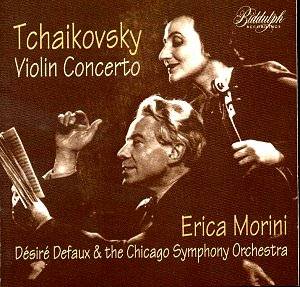AVAILABILITY
www.biddulphrecordings.com
Erica Morini was born
in Trieste, then part of the Austro-Hungarian
Empire, in 1904. Though her father was
Italian, her mother was Viennese and
the family moved to Vienna where Erica
studied
with her father who had been a student
of Joachim, before moving to the Conservatoire
to follow studies with Grün and, at
nine years of age, with Ševčik.
There was an accelerated, wunderkind
aura about her and her debut three years
later was conducted by Oskar
Nebdal no less. Thereafter success came
quickly on the Continent, Britain and
in America until her retirement in 1976.
I’ve written extensively about Morini
in relation to her Arbiter and Music
and Arts releases, much of which preserve
live performances of works otherwise
unrecorded commercially, and it’s been
an exceptionally engaging experience
to contrast the two recordings she left
us of the Tchaikovsky (the other was
recorded in London with Rodzinski) a
discography recently augmented by Music
and Arts’ retrieval of her live 1957
Paris performance with Horenstein.
This Defauw led recording,
made with his Chicago orchestra in December
1945, is the fleetest and most technically
adroit of the surviving traversals.
It helps that her conductor was himself
a violinist and a most sympathetic collaborator.
Even judged against her contemporaries
in this repertoire, the molten if slow
Elman, the intense razor-sharp Heifetz,
the patrician elegance of Francescatti,
the muscularity of Stern, the expressive
depth of
Oistrakh, she still managed to carve
out her own niche. Though she had a
small tone with a limited vibrato –
her training with Ševčik was quite
distinct from that of, say, her Russian
contemporaries – she was still able
to compete in the romantic masterpieces.
Others before her who lacked opulent
tonal resources, Zimbalist say, managed
to compete in the competitive American
market, albeit at a lower level. The
clarity of her bowing in the opening
movement is without question and her
technique is strong and resilient. She’s
stylish with some occasionally business-like
passagework; tonally speaking her lower
two strings don’t sound quite as much
as the upper two but I liked her easeful
slides in the Andante at a good forward
tempo. The portamenti are endemic in
this movement but are executed with
such sophisticated taste as to be natural
constituents of her armoury of expressive
nuance. Her finale is energized but
not motoric – much faster than Horenstein,
significantly more incisive than Rodzinski.
We also have a mixed
programme of Victors recorded between
1941-45. Her Vivaldi in the Respighi
arrangement is very cleanly articulated
with delicious diminuendi and crescendi.
Her vibrato in the little Largo is quite
fast and the finale is lightly and discriminatingly
projected, not at all masculine. She
was always fond of Wieniawski – Arbiter
has issued a complete Second Concerto
– and the Capriccio-Valse is a delicious
example of her affinities. Her Ravel
isn’t sensuous in the Thibaud mould
and nor is her Brahms cut from Toscha
Seidel’s cloth. The Hungarian Dances
are more Viennese than Magyar, puckish,
rather small-scale but elegant and full
of teasing rubato.
The transfers are by
Mark Obert-Thorn and are first rate;
there’s a tough-sounding side join at
the start of the Tchaikovsky but that
apart things go smoothly and well. Black
marks to Biddulph for spelling the conductor
‘Defaux’ on the booklet cover but we
can forgive the faux pas for so much
elegant and winning musicianship.
Jonathan Woolf

